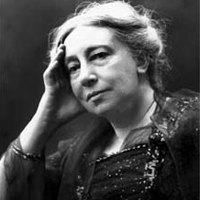Conflict in Gregory's The Rising of the Moon
The conflict in The Rising of the Moon is prominently noticeable. The Sergeant in the play represents law and justice. He is a worker in the office of the British government. His duty is to protect the British government from any harm. To maintain peace and order, justice and stability is his major duty. For this duty of his the British government has been giving him salary.

Lady Gregory (1852-1932)
With this payment for his duty, he fulfills his essential requirement of life. Hence, he is compelled to be loyal to the British government. But his own brethren, an Irish revolutionary, have been launching a revolution against the British government. As a loyal worker of the British government, he is compelled to captivate the man. As an Irish man in the service of the British regime, he could not help extend a grain of support and sympathy to the grand cause of the Irish revolution. The Sergeant too wants freedom. He too does not like slavery and bondage. He had once a revolutionary instinct, revolutionary disposition. When he entered into the field of service, this revolutionary instinct and disposition dwindled down. But it remarked in the latent form. That is why he was tempted to let the ballad singer escape from the preying eyes of the policemen. Within the mind of the Sergeant there is a conflict between his sense of duty and his painful awareness of freedom.
In this play, sense of duty and an impulse for freedom are in a course of conflict. The conflict has given more vitality to the thematic resource of the play. Similarly the level of conflict has also assumed another form. There is also a conflict between the uniform and the disguise. The Sergeant is in the uniform. The Sergeant being in the uniform reveals that he is not at all interested in any impulsive acts and thinking except his professional duty. On the contrary, the revolutionary hero is in a disguised appearance of being a ballad singer. That is why it became very much easier for the ballad singer to woo the rigid heart of the sergeant through the trick of singing a ballad. By singing a ballad the disguised revolutionary hero succeeded in reviving the forgotten and hidden instinct for the revolution. With an impact of revolutionary ballad the Sergeant came unknowingly close to the sentiment of rebellion, particularly embodied in the ballad singer who is in fact a revolutionary hero committed to emancipate Ireland from the clutch of the British Tyranny.
Similarly, there is also a conflict between the Sergeant's cupidity (greed for reward) and the man's rhetoric. At first when the play opens, we come across a situation in which the Sergeant seems to be greedy for reward. But later on his cupidity evaporated as he came in conversational touch with the ballad singer. By the time the ballad singer's rhetoric penetrated the professionally rigid heart of the Sergeant. The ballad singer's rhetoric revived the revolutionary disposition of the Sergeant. Affected by the revolutionary disposition of the ballad singer the Sergeant unknowingly happened to lose the fascination of the reward.
In the same vein, there is a conflict between the tradition of the law and the tradition of the outlaw. The Sergeant stands for the tradition of the law. He is the Sergeant, whose work is to maintain the law and justice in the country. For the most part, he is interested to maintain the status quo. But the ballad singer, an Irish revolutionary hero is in disguise, aims at effecting such a change in which the people at the bottom will be at the top. The ballad singer, a disguised man, wants to effect a real transformation by virtue of the tradition of the outlawed. Viewed from the perspective of the status quo the Irish revolutionary hero appears to be an outlawed man. But viewed from the tradition of revolution the man seems to be a hero of the noble cause of the political emancipation. Perhaps, the playwright Lady Gregory intends to say that the day of liberation can be brought only through the tradition of the outlawed.
